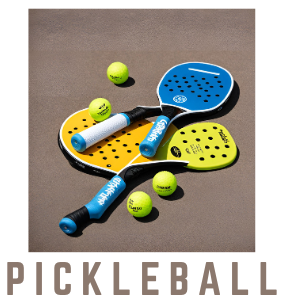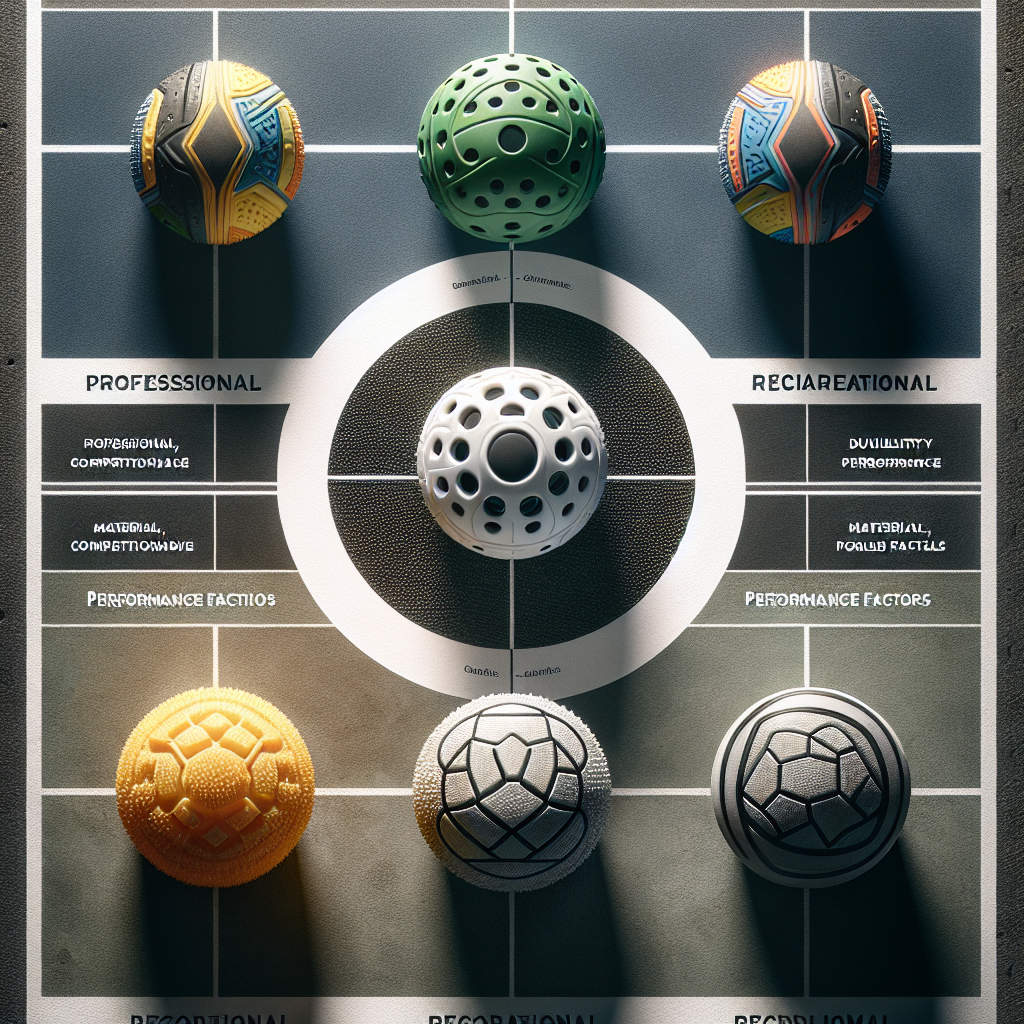In the world of pickleball, it’s important to understand the nuances between different types of balls. The distinction between a competition and recreational pickleball ball may seem insignificant, but it can greatly impact your game. While both balls may appear similar at first glance, their design and construction vary in ways that can make or break your performance on the court. So, let’s dive into the details and explore the key differences between these two types of pickleball balls.
Material
Competition balls
Competition pickleball balls are typically made from a durable plastic material. These balls are specifically designed to withstand the intense gameplay of competitive matches. The material used in competition balls is engineered to have a high level of resilience and resistance to wear and tear. This ensures that the ball will maintain its shape and performance even after repeated use in high-pressure situations.
Recreational balls
Recreational pickleball balls, on the other hand, are often made from a softer and less durable material. These balls are intended for casual play and are not built to withstand the same level of force and impact as competition balls. While they may not have the same longevity as competition balls, recreational balls are more forgiving and can be a great option for beginners or for casual games with friends and family.
Durability
Competition balls
When it comes to durability, competition balls have the upper hand. As mentioned before, these balls are constructed from a resilient plastic material that can handle the fast-paced and powerful shots that are common in competitive pickleball. The durability of competition balls ensures that they can withstand the rigors of intense gameplay, making them a reliable choice for serious players.
Recreational balls
Recreational balls, while not as durable as competition balls, can still hold up well during casual play. They may not have the same level of resilience as competition balls, but they are designed to be durable enough to withstand regular use. If you primarily play pickleball for recreation and do not engage in highly competitive matches, recreational balls can be a suitable and cost-effective option.
Performance
Competition balls
When it comes to performance, competition balls are designed to meet the high standards of professional and competitive play. These balls are carefully engineered to provide consistent flight and bounce characteristics, allowing players to accurately predict the ball’s trajectory and plan their shots accordingly. The construction and materials used in competition balls result in a balanced and predictable performance, which is essential for players who strive for precision and control in their gameplay.
Recreational balls
While recreational balls may not offer the same level of performance as their competition counterparts, they still provide a satisfactory playing experience for casual players. These balls may have slightly different flight patterns and bounce characteristics compared to competition balls, but they can still be enjoyable to use during recreational matches. It’s important to manage your expectations when it comes to performance and understand that recreational balls are not designed to meet the same standards as competition balls.
Weight
Competition balls
Competition pickleball balls are typically standardized in terms of weight. The official weight for a competition ball is around 0.88 ounces or 26 grams. This standardized weight ensures consistency in gameplay and allows players to develop their skills based on a consistent feel and response from the ball. The weight of competition balls is carefully calibrated to provide optimal balance and control for players who are looking to perform at their best.
Recreational balls
Recreational pickleball balls may vary slightly in weight, and they do not adhere to strict standardization like competition balls. The weight of recreational balls can range between 0.8 to 1.1 ounces or 23 to 31 grams. While this slight variation may not drastically impact gameplay for casual players, it’s worth noting that the non-standardized weight of recreational balls can result in slightly different flight and bounce characteristics.
Bounce
Competition balls
The bounce of a pickleball is crucial for fair and consistent gameplay, especially in competitive environments. Competition balls are designed to have a reliable and predictable bounce, enabling players to anticipate and react to shots effectively. The construction and materials used in competition balls contribute to their consistent bounce, ensuring a level playing field for competitors.
Recreational balls
Recreational pickleball balls may have a slightly different bounce compared to competition balls. The softer nature of recreational balls can sometimes cause them to have a slightly lower and less consistent bounce. This variation in bounce may not significantly impact casual gameplay, but it is important to be aware of these differences when transitioning from recreational to competitive settings.
Visibility
Competition balls
Visibility is a key consideration, especially in fast-paced competitive matches. Competition balls are typically designed with vibrant colors that enhance their visibility on the court. Bright colors like neon green or yellow are commonly used for competition balls, ensuring that players can easily track the movement of the ball during intense gameplay. The high visibility of competition balls helps players react quickly and make accurate shots.
Recreational balls
Recreational pickleball balls also come in a variety of colors but may not prioritize visibility to the same extent as competition balls. While they may still be brightly colored, recreational balls might not have the same level of visibility as competition balls. If playing in low light conditions or with players of varying skill levels, it may be beneficial to opt for a more visible competition ball for better overall visibility on the court.
Cost
Competition balls
Competition pickleball balls are typically priced higher than recreational balls due to their superior quality and specialized construction. These balls are specifically designed for competitive play, requiring meticulous engineering and reliable performance. The higher cost of competition balls reflects the investment in materials and manufacturing processes aimed at meeting the demands of serious players who prioritize performance.
Recreational balls
Recreational pickleball balls are generally more affordable than competition balls. Their construction and materials are often less expensive, making them a budget-friendly option for casual players. If you primarily play pickleball for leisure and do not require the same level of performance as competition balls, opting for recreational balls can be a cost-effective choice that still allows for enjoyable gameplay.
Usage
Competition balls
Competition pickleball balls are primarily intended for use in professional and competitive settings. These balls are designed to adhere to strict standards and regulations, ensuring fair and consistent gameplay in tournaments and matches. If you actively participate in competitive pickleball and want to replicate the conditions and standards of professional play, competition balls are the preferred choice.
Recreational balls
Recreational pickleball balls are ideal for casual and non-competitive play. Whether you’re playing pickleball with friends, family, or in a more relaxed setting, recreational balls provide a suitable option for enjoyable gameplay. Their forgiving nature and affordability make them accessible to players of all skill levels, making recreational balls a popular choice for recreational play.
Certifications
Competition balls
Competition pickleball balls often carry certifications that demonstrate their compliance with official standards and regulations. These certifications confirm that the balls meet specific requirements regarding size, weight, bounce, and other factors that are crucial for competitive play. Certifications such as the USAPA (USA Pickleball Association) approval ensure that competition balls are suitable for use in official tournaments and events.
Recreational balls
Recreational pickleball balls may not carry the same certifications as competition balls. Since they are not manufactured to meet the strict standards of competitive play, recreational balls may not undergo the same certification processes. However, this does not necessarily mean that recreational balls are of lesser quality or unsuitable for recreational play. The absence of certifications should be considered in the context of their intended usage.
Recommended for
Competition balls
Competition pickleball balls are recommended for serious and competitive players who aspire to participate in tournaments, leagues, and other high-level pickleball events. If you are fully committed to the sport and seek to challenge yourself against skilled opponents, competition balls will provide the performance and precision you need to elevate your gameplay.
Recreational balls
Recreational pickleball balls are recommended for casual players, beginners, and those who prioritize fun and socialization over intense competition. If you are new to pickleball, organizing a friendly match with friends, or looking to play in a more relaxed environment, recreational balls will serve you well. Their affordability and forgiving characteristics make them a popular choice for recreational play.
In conclusion, the difference between competition and recreational pickleball balls lies in their material, durability, performance, weight, bounce, visibility, cost, usage, certifications, and recommended usage. While competition balls are designed for serious and competitive play, recreational balls offer a more casual and affordable option for those who enjoy pickleball as a leisure activity. Consider your playing style, skill level, and goals when selecting the right ball for your pickleball experience.

